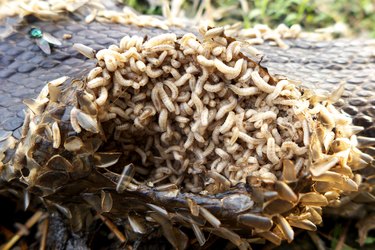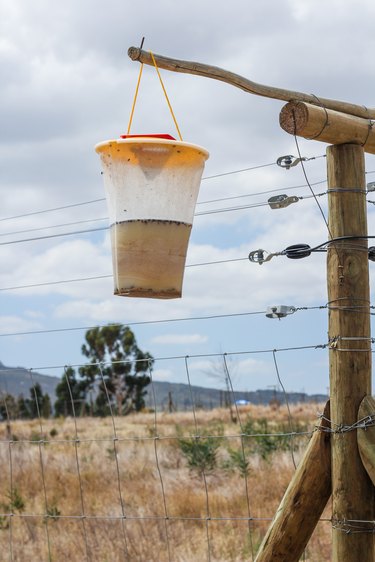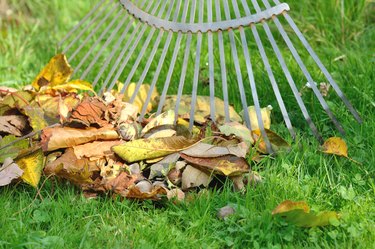
The days when medical professionals used maggots to clean wounds are long gone, so it's hard to imagine a beneficial use for either flies or their larvae. While the fly larvae (maggots) do process a certain amount of organic matter, they become both an inconvenience and a menace in their adult form. The use of pesticides around livestock and pets is ill-advised and, in some cases, illegal. Whenever possible, it's best to control flies using natural methods.
Discouraging Flies and Maggots
Video of the Day
Houseflies, face flies, blowflies and others all share a common affection for moist organic matter as an egg-laying medium. This is why maggots are so often spotted in piles of fresh manure or garbage cans containing discarded food -- and why every fly in the neighborhood congregates at the least sanitary home. Maggots eat garbage and excrement.
Video of the Day
Take away this amenity, and you'll reduce fly numbers. Keep trashcans covered, and empty them at least twice a week. Place outdoor garbage cans as far away from your home or building as possible to keep maturing flies outside. Check your window screens for holes, as well, and replace them if you find any. Remove pet waste from your yard as soon as possible. Pet chickens find maggots tasty and provide fresh eggs, so consider getting some if it is legal to keep them where you live.
Agricultural establishments and farms can also take measures to make themselves less attractive to flies. Spread barnyard manure immediately to expose it to sun and air. Doing so dries it out, making it less attractive as a breeding medium and kills any maggots that have already been deposited. Better yet, spread it near an anthill, if you have meat-eating ants around. Some ants view maggots as a tasty buffet. Free-range chickens and a number of wild birds will gladly spend the day doing the work of turning the manure for the privilege of gobbling up maggots. Let your chickens spend time in the barnyard, and find ways to encourage insect-loving birds to stay near.
Treating Flies and Maggots

There are many fly-capture devices on the market today, and the most effective for barns and large yards is the plastic bag or jar with a one-way entry point and fly attractant inside. Make sure the trap you purchase has the right attractant for the species of fly you are doing battle with. The label should list which flies the trap will capture. Hang the bag where the smell -- ambrosia to flies, but not to people -- will draw the flies away from your house and traffic areas, then keep the contents wet. A big fly bag will continue to trap and kill flies into the thousands if you make sure that the attractant never dries out. If it does dry out, even for a short time, it loses much of its effectiveness.
Electric fly traps are another excellent way to get rid of flies without chemicals, but should only be used indoors. These traps emit a soft light that attracts flies. Once drawn in, the flies find themselves stuck on glue boards that can easily be changed as needed. Traditional electric bug zappers are also effective but should only be used outside, as these devices simply drop the dead flies rather than catching and holding them.
If you find maggots in your trashcan or somewhere else, kill them instantly by pouring boiling water over them. You can also sprinkle diatomaceous earth over them. Diatomaceous earth is essentially tiny fossils with rough edges that kill the maggots by cutting their soft bodies. You can also sweep maggots into a plastic bag, seal it and dispose of it with your trash.
Breaking the Cycle

Even after the cold weather returns and flies seem to disappear, you can do battle with the next generation of maggots. When the cold weather hits, the pupating fly larvae don't complete their cycle, but, instead, stay in their little cocoons until things warm up. They do this in areas of undisturbed manure, lawn and garden debris or even the corners of outbuildings and under your porch.
Get rid of debris by composting it, burning it or otherwise disposing of it. You can also obtain a number of insect predators -- carried by many livestock supply houses and garden centers -- that will seek out those pupating larvae and lay their eggs in them. There are many varieties of predators, so study carefully which to buy and the best time in your climate to release it.
Waste no time, come spring, in attacking the adult fly population. Remember, one female can produce 500 maggots only two weeks after she emerges from her cocoon.